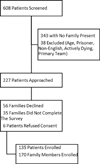Association Between Resilience and Family Member Psychologic Symptoms in Critical Illness
- PMID: 27097294
- PMCID: PMC4949118
- DOI: 10.1097/CCM.0000000000001673
Association Between Resilience and Family Member Psychologic Symptoms in Critical Illness
Abstract
Objectives: There are increased rates of depression, anxiety, and stress disorders in families of critically ill patients. Interventions directed at family members may help their ability to cope with this stress. Specifically, resilience is a teachable psychologic construct describing a person's ability to adapt to traumatic situations. Resilience can inherently assist individuals to diminish adverse psychologic outcomes. Consequently, we determined the relationship between resilience and symptoms of depression, anxiety, and acute stress in family members of critically ill patients.
Design: This is a cross-sectional study.
Setting: Three medical ICUs were screened by study staff.
Patients: Family members of ICU patients admitted for greater than 48 hours were approached for enrollment.
Interventions: The Connor-Davidson Resilience Scale was used to stratify family members as resilient or nonresilient.
Measurements and main results: The Hospital Anxiety and Depression Scale, Impact of Event Scale-Revised, and Family Satisfaction in the ICU were collected prior to ICU discharge to measure symptoms of depression, anxiety, and acute stress, as well as satisfaction with care. One-hundred and seventy family members were enrolled. Seventy-eight family members were resilient. Resilient family members had fewer symptoms of anxiety (14.2% vs 43.6%; p < 0.001), depression (14.1% vs 44.9%; p < 0.001), and acute stress (12.7% vs 36.3%; p = 0.001). Resilient family members were more satisfied with care in the ICU (76.7 vs 70.8; p = 0.008). Resilience remained independently associated with these outcomes after adjusting for family member age and gender, as well as the patient's need for mechanical ventilation.
Conclusions: When caring for the critically ill, resilient family members have fewer symptoms of depression, anxiety, and acute stress. Resilient families were generally better satisfied with the care delivered. These data suggest that interventions aimed at increasing resilience may improve a family member's experience in the ICU.
Conflict of interest statement
The remaining authors have disclosed that they do not have any potential conflicts of interest.
Figures



Similar articles
-
Association Between Resilience and Psychological Morbidity in Parents of Critically Ill Children.Pediatr Crit Care Med. 2020 Apr;21(4):e177-e185. doi: 10.1097/PCC.0000000000002237. Pediatr Crit Care Med. 2020. PMID: 32118694
-
Coping as a Multifaceted Construct: Associations With Psychological Outcomes Among Family Members of Mechanical Ventilation Survivors.Crit Care Med. 2016 Sep;44(9):1710-7. doi: 10.1097/CCM.0000000000001761. Crit Care Med. 2016. PMID: 27065467 Free PMC article.
-
Resilience and Mental-Health Symptoms in ICU Healthcare Professionals Facing Repeated COVID-19 Waves.Am J Respir Crit Care Med. 2024 Mar 1;209(5):573-583. doi: 10.1164/rccm.202305-0806OC. Am J Respir Crit Care Med. 2024. PMID: 38163380 Free PMC article.
-
Factors Affecting Anxiety and Depression Symptoms in Relatives of Intensive Care Unit Patients.J Intensive Care Med. 2016 Oct;31(9):611-7. doi: 10.1177/0885066615595791. Epub 2015 Jul 12. J Intensive Care Med. 2016. PMID: 26168801 Review.
-
Family response to critical illness: postintensive care syndrome-family.Crit Care Med. 2012 Feb;40(2):618-24. doi: 10.1097/CCM.0b013e318236ebf9. Crit Care Med. 2012. PMID: 22080636 Review.
Cited by
-
Incidence and factors associated with post-intensive care syndrome among caregivers of intensive care unit survivors: Protocol for a cohort study.PLoS One. 2025 May 16;20(5):e0324013. doi: 10.1371/journal.pone.0324013. eCollection 2025. PLoS One. 2025. PMID: 40378139 Free PMC article.
-
Postintensive care syndrome family: A comprehensive review.Acute Med Surg. 2024 Mar 11;11(1):e939. doi: 10.1002/ams2.939. eCollection 2024 Jan-Dec. Acute Med Surg. 2024. PMID: 38476451 Free PMC article. Review.
-
[A Structural Equation Model for Posttraumatic Growth among Cured Patients with COVID-19].J Korean Acad Nurs. 2023 Jun;53(3):309-323. doi: 10.4040/jkan.22118. J Korean Acad Nurs. 2023. PMID: 37435762 Review. Korean.
-
The impact of patient delirium in the intensive care unit: patterns of anxiety symptoms in family caregivers.BMC Health Serv Res. 2021 Nov 5;21(1):1202. doi: 10.1186/s12913-021-07218-1. BMC Health Serv Res. 2021. PMID: 34740349 Free PMC article.
-
Caregiver and care team perspectives of caregiver psychological distress and well-being during critical care hospitalization: a qualitative study.BMC Geriatr. 2025 Mar 13;25(1):167. doi: 10.1186/s12877-025-05769-0. BMC Geriatr. 2025. PMID: 40082775 Free PMC article.
References
-
- Christakis NA, Allison PD. Mortality after the hospitalization of a spouse. [Internet] [cited 2013 Nov 2];N Engl J Med. 2006 354:719–730. Available from: http://www.ncbi.nlm.nih.gov/pubmed/16481639. - PubMed
-
- Azoulay E, Pochard F, Kentish-Barnes N, et al. Risk of post-traumatic stress symptoms in family members of intensive care unit patients. [Internet] [cited 2013 Aug 24];Am J Respir Crit Care Med. 2005 171:987–994. Available from: http://www.ncbi.nlm.nih.gov/pubmed/15665319. - PubMed
-
- Lemiale V, Kentish-Barnes N, Chaize M, et al. Health-related quality of life in family members of intensive care unit patients. [Internet] [cited 2013 Nov 2];J Palliat Med. 2010 13:1131–1137. Available from: http://www.ncbi.nlm.nih.gov/pubmed/20836638. - PubMed
-
- Anderson WG, Arnold RM, Angus DC, et al. Posttraumatic stress and complicated grief in family members of patients in the intensive care unit. [Internet] [cited 2013 Aug 28];J Gen Intern Med. 2008 23:1871–1876. Available from: http://www.pubmedcentral.nih.gov/articlerender.fcgi?artid=2585673&tool=p.... - PMC - PubMed
-
- Kross EK, Engelberg Ra, Gries CJ, et al. ICU care associated with symptoms of depression and posttraumatic stress disorder among family members of patients who die in the ICU. [Internet] [cited 2013 Aug 13];Chest. 2011 139:795–801. Available from: http://www.pubmedcentral.nih.gov/articlerender.fcgi?artid=3071273&tool=p.... - PMC - PubMed
Publication types
MeSH terms
Grants and funding
LinkOut - more resources
Full Text Sources
Other Literature Sources
Medical

